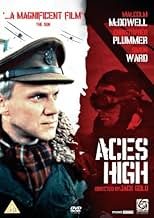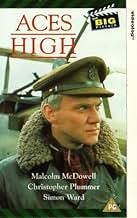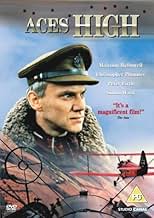IMDb RATING
6.6/10
3.5K
YOUR RATING
In World War I, the high casualty rate amongst the rookie pilots of the Royal Flying Corps puts an enormous strain on the survivors.In World War I, the high casualty rate amongst the rookie pilots of the Royal Flying Corps puts an enormous strain on the survivors.In World War I, the high casualty rate amongst the rookie pilots of the Royal Flying Corps puts an enormous strain on the survivors.
- Director
- Writers
- Stars
- Nominated for 1 BAFTA Award
- 1 win & 2 nominations total
Gilles Béhat
- Beckenauer
- (as Gilles Behat)
- Director
- Writers
- All cast & crew
- Production, box office & more at IMDbPro
6.63.4K
1
2
3
4
5
6
7
8
9
10
Featured reviews
Journeys End with WW1 planes
Ive seen this film about four times. A great film that didn't flinch from showing a class-ridden and brutal look at the reality of World War 1. Malcolm MacDowell was excellent as the Squadron Leader and Christopher Plummer was superb as the 'kindly uncle' figure who gave allowances and understanding to young pilots who were faced with the prospect of death every day on active duty.
World War One films are very hard to make , simply because the Director has to capture and expose the horror of a modern war in a period where the participants are caught in a mood of adventure and duty.Aces High demonstrates this fact entirely.
The film is based on the book Journeys End , and damn I missed it when it was on at the theatre , but hey. Anyway this film version is turned into the Play with Planes.
Anyway a great Film and brilliantly acted. I highly recommend this film to any war film buff , like myself.
World War One films are very hard to make , simply because the Director has to capture and expose the horror of a modern war in a period where the participants are caught in a mood of adventure and duty.Aces High demonstrates this fact entirely.
The film is based on the book Journeys End , and damn I missed it when it was on at the theatre , but hey. Anyway this film version is turned into the Play with Planes.
Anyway a great Film and brilliantly acted. I highly recommend this film to any war film buff , like myself.
10afison
I saw this with my grandfather
I remember seeing this movie with my grandfather when it came out. My Grandfather was an observer in the RFC during WWI and so had real life views on what the movie was portraying.
I found the movie fascinating and well made, albeit rather sad, but my opinion paled against that of my grandfather. He never spoke too much about that time, but he did comment on how well the movie was made and how it fairly accurately summed up the feelings of the day, the high mortality, the bravery and the terrible mental burden it put on the combatants.
He was shot down 90 years ago over St Julien in France but survived to have a full and fruitful life. Yes i know some purists are mentioning the inaccuracy of some of the planes but to him it did not matter as the story of young human life was more relevant. I would advise anyone to see this movie to remind themselves of the great risks and sacrifices these young men took, he was 22 when he was shot down but many were much younger.
a great reminder of the risks taken by many young men who should have been enjoying life at that time. We should never forget them nor allow the lessons learned to fade away
I found the movie fascinating and well made, albeit rather sad, but my opinion paled against that of my grandfather. He never spoke too much about that time, but he did comment on how well the movie was made and how it fairly accurately summed up the feelings of the day, the high mortality, the bravery and the terrible mental burden it put on the combatants.
He was shot down 90 years ago over St Julien in France but survived to have a full and fruitful life. Yes i know some purists are mentioning the inaccuracy of some of the planes but to him it did not matter as the story of young human life was more relevant. I would advise anyone to see this movie to remind themselves of the great risks and sacrifices these young men took, he was 22 when he was shot down but many were much younger.
a great reminder of the risks taken by many young men who should have been enjoying life at that time. We should never forget them nor allow the lessons learned to fade away
10tiomingo
"A sad story brilliantly told"
I remember "Aces High" when it was released in Argentina (1977. Since then I had the opportunity of watching it twice on video. For me is an excellent example that you still can produce a great film even if the subject (WWI) has been treated dozens of times. Although I have not read "Journey's End" I did read many factual accounts of the air war on the Western Front during WWI and the spirit of those terrible years has been faithfully re-created. Malcom McDowell proves, once a again, what an excellent actor he is and the rest of the cast is as good as him.
The character played by Simon Ward, is one of the most moving and important within the film. This was brought to my attention last year when, watching a documentary about the Battle of Britain, I saw a former Hurricane pilot telling how depressed he was by the terribly high casualty-rate that he decided to stop making friends,since more likely they shall be dead within a fortnight. With this in mind Simon Ward's performance has deeper meaning. It is not only that he is haunted by the idea of his inevitable death, he doesn't want to make friends because he has lost too many.
The scene where Malcom McDowell throws a party to celebrate the arrival of "his" prisoner (the German pilot)would seem strange if not ridiculous to those who do not have a certain knowledge of the mentality of the European aristocracy, who formed the backbone of the officer-class in those days. According to them war was a gentlemanly affair were certain principles should be observed; one of them was the corteous treatment of prisoners (as long as they belong the same class)particularly if they had fought bravely. The concept was already an anachronism in 1914 where the colossal scale of the slaughter and its horrendous impersonality made the illusion of "the noble duel" obsolete if not ridiculous BUT, there was the aeroplane, a chance to move the clock back to the days of aristocratic man-to-man fights, a chance to escape the modern, faceless and industrialized murder of trench warfare. That's why WWI fighter pilots (all of them gentlemen in the truest sense of the word) behaved in that way. This film is also a very sad reminder of the destruction of a whole world that, with all its defects, had some very valuable principles. Principles that nowadays most of people would laugh at, which is also very sad.
The character played by Simon Ward, is one of the most moving and important within the film. This was brought to my attention last year when, watching a documentary about the Battle of Britain, I saw a former Hurricane pilot telling how depressed he was by the terribly high casualty-rate that he decided to stop making friends,since more likely they shall be dead within a fortnight. With this in mind Simon Ward's performance has deeper meaning. It is not only that he is haunted by the idea of his inevitable death, he doesn't want to make friends because he has lost too many.
The scene where Malcom McDowell throws a party to celebrate the arrival of "his" prisoner (the German pilot)would seem strange if not ridiculous to those who do not have a certain knowledge of the mentality of the European aristocracy, who formed the backbone of the officer-class in those days. According to them war was a gentlemanly affair were certain principles should be observed; one of them was the corteous treatment of prisoners (as long as they belong the same class)particularly if they had fought bravely. The concept was already an anachronism in 1914 where the colossal scale of the slaughter and its horrendous impersonality made the illusion of "the noble duel" obsolete if not ridiculous BUT, there was the aeroplane, a chance to move the clock back to the days of aristocratic man-to-man fights, a chance to escape the modern, faceless and industrialized murder of trench warfare. That's why WWI fighter pilots (all of them gentlemen in the truest sense of the word) behaved in that way. This film is also a very sad reminder of the destruction of a whole world that, with all its defects, had some very valuable principles. Principles that nowadays most of people would laugh at, which is also very sad.
Good for the beginners
I have seen this film when I was young, and was very impressed. Probably it turns on my interest in aerial warfare in World War I. Despite technically awful from the airplanes types view, the film shows exactly, with no glamour, how was the life of fighter pilots in WWI.
Life expectancy for a new pilot was just two weeks. There was no real training for the pilots, and few of the old pilots care about teaching anything to the new ones. If you look at the dangerous machines they should fly, antiaircraft fire and the enemy machines, it's a miracle that someone has survived to told us the history.
Life expectancy for a new pilot was just two weeks. There was no real training for the pilots, and few of the old pilots care about teaching anything to the new ones. If you look at the dangerous machines they should fly, antiaircraft fire and the enemy machines, it's a miracle that someone has survived to told us the history.
Well done WWI drama/character study
Written from the English point of view, this film seems to have it's tongue in it's cheek at times, but it's not at all funny. There are several flashes of humor in the early scenes, at the expense of the British upper class, but those quickly give way to the special horrors of the first war fought in the air.
Patriotic young pilots straight out of college lost their lives in literally a few days time, due to their inexperience and the stress of this new kind of battle. Malcolm McDowell has the unwelcome task of leading the 76th Squadron and also visiting colleges to drum up recruits, all the while knowing he's inviting them to an almost certain death. He keeps these new recruits at arms length to soften the blow to his mental health when they invariably get shot down. When he shows up at his own alma mater, an idealistic young man, played by Peter Firth, signs up for McDowell's squadron. On his arrival at the airfield, Firth sees the evidence of the turnover in pilots but fails to see the connection to his own longevity; a family photo and personal effects are whisked out of the room he's been assigned, right in front of his eyes. He is introduced to Simon Ward, a stony-faced pilot who by the end of the movie is finally driven insane by the awful, daily anticipation of his own death in battle.
The young pilots experience the respect that their station in the Air Corps elicits from the locals and from women, but at the same time they see how they are more likely to be killed than the average filthy foot soldier. Firth is taken with a local cabaret girl, who invites him to her room one night. The next night, when he expects her to be glad to see him, she ignores him and pays attention to an older, richer officer. The very next day the pilots are given the task of destroying German spotter balloons, which always have heavy gun and air protection, and the older pilots know this is almost a death warrant. Six planes go out, with McDowell and Firth in two of them, but you'll have to watch the film to find out how many come back.
A very good, but depressing, film, McDowell is subdued in his performance and seems to come out of his cocoon only at the end. This is necessary, I think, for his character to survive in the surroundings of constant tragedy. Firth is naive in the extreme, and this probably a correct portrayal of a green recruit in WWI, where there was no frame of reference for how dangerous those early airplanes were. The film shows us just how little the commanders valued the lives of their men by sending them out unprepared and inexperienced, and that they know after one group of fliers is decimated, there is always a fresh batch of innocent boys to take their place. I recommend the film highly, since it has a firm anti-war message.
Patriotic young pilots straight out of college lost their lives in literally a few days time, due to their inexperience and the stress of this new kind of battle. Malcolm McDowell has the unwelcome task of leading the 76th Squadron and also visiting colleges to drum up recruits, all the while knowing he's inviting them to an almost certain death. He keeps these new recruits at arms length to soften the blow to his mental health when they invariably get shot down. When he shows up at his own alma mater, an idealistic young man, played by Peter Firth, signs up for McDowell's squadron. On his arrival at the airfield, Firth sees the evidence of the turnover in pilots but fails to see the connection to his own longevity; a family photo and personal effects are whisked out of the room he's been assigned, right in front of his eyes. He is introduced to Simon Ward, a stony-faced pilot who by the end of the movie is finally driven insane by the awful, daily anticipation of his own death in battle.
The young pilots experience the respect that their station in the Air Corps elicits from the locals and from women, but at the same time they see how they are more likely to be killed than the average filthy foot soldier. Firth is taken with a local cabaret girl, who invites him to her room one night. The next night, when he expects her to be glad to see him, she ignores him and pays attention to an older, richer officer. The very next day the pilots are given the task of destroying German spotter balloons, which always have heavy gun and air protection, and the older pilots know this is almost a death warrant. Six planes go out, with McDowell and Firth in two of them, but you'll have to watch the film to find out how many come back.
A very good, but depressing, film, McDowell is subdued in his performance and seems to come out of his cocoon only at the end. This is necessary, I think, for his character to survive in the surroundings of constant tragedy. Firth is naive in the extreme, and this probably a correct portrayal of a green recruit in WWI, where there was no frame of reference for how dangerous those early airplanes were. The film shows us just how little the commanders valued the lives of their men by sending them out unprepared and inexperienced, and that they know after one group of fliers is decimated, there is always a fresh batch of innocent boys to take their place. I recommend the film highly, since it has a firm anti-war message.
Did you know
- TriviaThis movie is an adaptation of the play "Journey's End" by R.C. Sherriff, written just after World War I. The setting is transplanted from the trenches to an airfield, but most of the characters and some incidents are almost unchanged.
- GoofsSinclair informs Croft that Gresham uses a Nieuport "that he swears by", but every time we see Gresham aloft he is flying an SE5 like the rest of the squadron.
- Quotes
Mess Corporal Bennett: [as the pilots set off early in the morning on a dangerous mission] How many for breakfast? Any of them?
- Crazy creditsOpening credits prologue: England October 1916
- Alternate versionsSome DVD releases feature a shorter print which reduces the French restaurant scene and misses out shots of the officers looking at a slideshow of nude photographs. These appear to have been made by the distributor, as the film has never been cut by the BBFC.
- ConnectionsEdited into Blackadder Goes Forth: Private Plane (1989)
- SoundtracksUnder the Bridges of Paris
(Sous les Ponts de Paris)
(uncredited)
Music by Vincent Scotto
French lyrics by Jean Rodor
English lyrics by Dorcas Cochran
- How long is Aces High?Powered by Alexa
Details
- Release date
- Countries of origin
- Languages
- Also known as
- Schlacht in den Wolken
- Filming locations
- Production companies
- See more company credits at IMDbPro
Box office
- Budget
- £1,250,000 (estimated)
Contribute to this page
Suggest an edit or add missing content





































